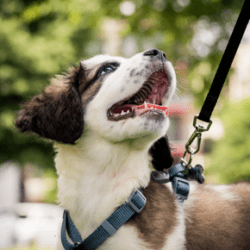The essential puppy socialisation guide every new owner needs
Getting a new puppy is one of the most exciting experiences life has to offer and it is an amazing feeling when you become a pet parent. However, it is common for new owners to underestimate their newfound responsibilities when taking good care of a puppy.
Vet nurses at our Devizes practice are here to help you through your journey, giving advice on socialisation, diet, training, exercise, and visits to the vet.
Check out their list of essential needs below and download our handy Puppy Socialisation Checklist:
Everything your new puppy needs
Socialisation
In the first three months of a puppy’s life, they go through what is known as their ‘socialisation period’. This is an important stage because they begin to learn about the environment around them as well as learn what correct behaviour looks like. This will set them in good stead for socialising, having a good temperament around people and other animals, and can even make dog walking more pleasant.
Our nursing team recommend that to begin with, friendly, vaccinated adult dogs are the best companions for your new puppy when they come home with you as they can let off some steam, learn canine social cues, and build confidence around other dogs. If you have a cat in your home, when introducing your puppy, keep them on a lead and allow the cat to have an escape route; it is often very stressful for a cat to have a new, hyperactive puppy in their home.
Our team have put together a handy Puppy Socialisation checklist that covers lots of experiences for your new pet; download it here:
Get our Puppy Socialisation Checklist
Diet
Nutrition is of the upmost importance when you are looking after a new puppy to ensure optimal growth, development of their physical systems, and overall welfare as they get older.
When buying pet food from the supermarket or a company online, make sure to look at the information label. Here you will find what age group the food is designed for, dry matter percentage, and how many calories are in the serving, amongst more detail about protein and other nutrients. If you have any queries involving diet, do get in touch with our team at Devizes by calling 01380 723687.
Training and exercise
Training and exercise should be worked into your furry friend’s day-to-day routine, so they get into a habit of exhibiting good behaviour. Training should encourage and support sustainable toileting, sleeping arrangements, them getting used to being alone in the house, and conduct around food, people and other animals.
As for exercise, our Head Nurse Sarah advises it is important that puppies go for a walk every day, but there are different lengths of time for different ages and breeds. Not only will this let them expel some energy whilst developing a healthy respiratory and musculoskeletal system, it will also allow them to explore new scents and environments.
Contact us to ask advice on how much exercise your age and breed of puppy requires.
Vet visits
When you bring your puppy home, you need to know if they are vaccinated, have any gastrointestinal parasites, or if they have a runny nose or cough. If they are vaccinated and free from illness, then they can socialise with other animals.
Puppies will usually be vaccinated and microchipped at 8 weeks old and then vaccinated again at 12 weeks to boost their immunity, but other protocols may be followed depending on the breed. You should also bring your puppy to our Devizes vet practice to get an overall health check and set up a plan for booster vaccinations, parasite control, get advice on nutrition, and to ask any questions about puppy rearing.
Start socialising your new puppy
Overall, the first few months you have with your puppy are crucial for creating a suitable routine and for developing a precious bond to ensure both you and your pet live happy lives together.
< Back to articles Estcourt Vets Devizes
Estcourt Vets Devizes